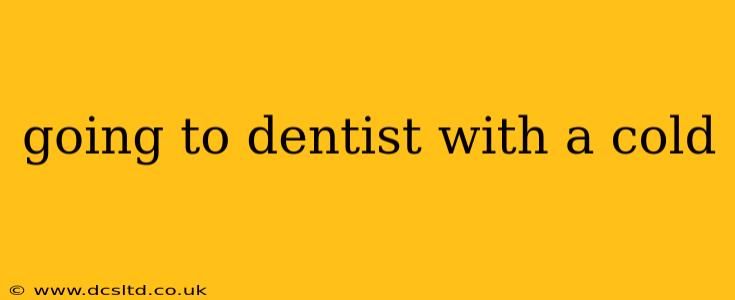Visiting the dentist is crucial for maintaining good oral health, but what happens when you're under the weather? Going to the dentist with a cold can be a tricky situation, balancing the need for dental care with the potential for spreading germs. This comprehensive guide will help you determine whether you should reschedule your appointment or if it's safe to proceed. We'll address common concerns and provide valuable insights based on expert recommendations.
Should I go to the dentist if I have a cold?
This is the million-dollar question, and the answer isn't a simple yes or no. It depends on the severity of your cold and the type of dental appointment you have scheduled. A mild cold with only a runny nose and slight congestion might be manageable, but a severe cold with a high fever, body aches, and significant respiratory symptoms warrants rescheduling. Your dentist's office is a place where germs can easily spread, and you want to avoid potentially infecting others, especially vulnerable patients.
What are the risks of going to the dentist with a cold?
The primary risk of going to the dentist with a cold is the potential to spread your illness to other patients and dental staff. Dental offices are enclosed spaces with close contact between individuals, making it an ideal environment for transmission of respiratory viruses. Furthermore, some dental procedures, such as those involving aerosols (like cleaning or drilling), can potentially increase the risk of spreading the virus. For those with weakened immune systems, the risk is even higher.
Can I spread a cold at the dentist?
Yes, you can certainly spread a cold at the dentist. The close proximity and shared air space increase the likelihood of transmission. Even if you take precautions like covering your mouth and nose, airborne droplets from coughs and sneezes can still travel and infect others. Consider the well-being of the dental staff and other patients when making your decision.
When should I reschedule my dentist appointment?
Reschedule your appointment if you experience any of the following symptoms:
- High fever: A fever indicates your body is fighting a significant infection, and it's best to stay home and recover.
- Severe cough: A persistent and forceful cough increases the risk of spreading respiratory viruses.
- Body aches and fatigue: These symptoms suggest a more serious illness and warrant rest and recovery.
- Significant congestion: Difficulty breathing or significant nasal congestion can make it difficult to undergo dental procedures comfortably.
- Contagious symptoms: If you have any contagious symptoms such as vomiting or diarrhea, postpone your appointment.
What if I only have a mild cold?
If your cold is mild, involving only a runny nose or slight sore throat, you might still consider rescheduling. While the risk might be lower, it's still a possibility. Discuss the situation with your dentist's office; they can offer guidance based on your specific symptoms and the type of procedure scheduled. They may recommend rescheduling or suggest precautions you can take.
How long should I wait to go to the dentist after a cold?
Ideally, wait until you're completely symptom-free for at least 24-48 hours before scheduling your appointment. This ensures you're no longer contagious and minimizes the risk of infecting others. Remember to inform your dentist's office of your recent illness.
What should I tell my dentist if I have a cold?
Honesty is paramount. Always inform your dentist's office about your cold symptoms before your appointment. This allows them to assess the situation and make the best recommendation for you and the safety of others. They may reschedule your appointment or advise on precautions.
By carefully considering your symptoms and following these guidelines, you can make an informed decision about whether to proceed with your dental appointment or reschedule for a healthier time. Remember, responsible behavior protects both yourself and others.
